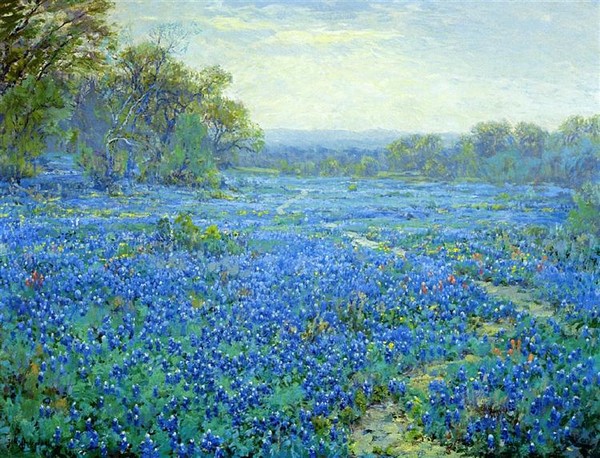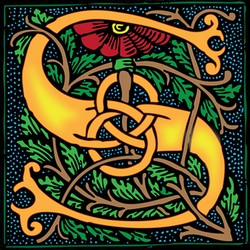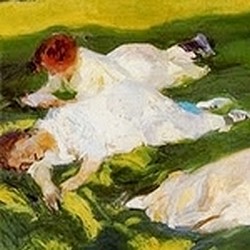
To follow the career of a singer from its early years is exciting, we’ve talked about it before; it means watching how he chooses the repertoire, how his voice evolves, how he keeps learning, the way he runs his career... This follow-up is usually done in small groups, until one day his name begins to often appear in the media and his music is widely spread. That's the time of showing off; we really like saying things such as “I heard him in his debut” or “I told you that he was good”. Well, let's anticipate the moment, because Deutsche Grammophon announced a new artist some days ago: Andrè Schuen. His recording of Die schöne Müllerin will be released next spring and we will show the baritone off.
In the meantime, we will continue to enjoy his voice and his music in Vilabertran, because Andrè Schuen and Daniel Heide are coming for the third time to the Schubertíada. They have prepared a programme with Schubert and Mahler, one of the most harmonious combinations that can be made, in my opinion. I'm sorry that they had to shorten the programme because of the security measures, c'est la vie!
The concert on Saturday 22 will begin with the Lieder eines fahrenden Gesellen [Songs of a wayfarer], a sort of echo of the Winterreise listened the day before, and it will end with a cycle that I love from the first note to the last, the Rückert-Lieder, with its large, impressive songs and the small beauties; Thomas Quasthoff said in an interview that Schubert's songs fly through the sky like angels and I think that this feeling also applies to the three miniatures of Mahler's Rückert-Lieder.
Among the two Mahler's group of songs we're listening three Lieder by Schubert also with poems by Rückert, Sei mir gegrüßt, Dass sie hier gewesen and Du bist die Ruh. In this particular case, the angels fly, remain among us, and we even forget to breathe. Rückert's name is known thanks to Mahler, but Schubert was the first composer that put his freshly printed poems into music; to listen to their works together has an added value (we should talk more often about the pleasure of listening to the same songs in different contexts).
The Lieder eines fahrenden Gesellen in the version for voice and piano also have an added value, because it's performed (and recorded) much more often in the version for voice and orchestra; I chose to share Ging heut morgen übers Feld performed by Thomas Hampson and David Lutz. In this second Lied of the cycle, the abandoned lover walks through the countryside on a splendid morning, but his sorrow prevents him from noticing the beauty that surrounds him. We previously listened to the last song, here you have the links to this song and the rest of the songs in the programme we've heard so far.
- Lieder eines fahrenden Gesellen
- n. 4 Die zwei Augen
As I'm writing this article, tickets for Andrè Schuen and Daniel Heide concert are sold out; whether you can't be in Vilabertran or you're thinking of listening to the duo again, keep in mind that they will perform at L'Auditori Barcelona in March.
Ging heut morgen übers Feld,
Tau noch auf den Gräsern hing;
Sprach zu mir der lust’ge Fink:
„Ei du! Gelt?
Guten Morgen! Ei gelt? Du!
Wird’s nicht eine schöne Welt?
Zink! Zink! Schön und flink!
Wie mir doch die Welt gefällt!“
Auch die Glockenblum’ am Feld
Hat mir lustig, guter Ding’,
Mit den Glöckchen, klinge, kling,
Ihren Morgengruß geschellt:
„Wird’s nicht eine schöne Welt?
Kling, kling! Schönes Ding!
Wie mir doch die Welt gefällt! Heia!“
Und da fing im Sonnenschein
Gleich die Welt zu funkeln an;
Alles Ton und Farbe gewann
Im Sonnenschein!
Blum’ und Vogel, groß und klein!
„Guten Tag! Guten Tag!
Ist’s nicht eine schöne Welt?
Ei du, gelt? Schöne Welt?“
Nun fängt auch mein Glück wohl an?
Nein, nein, das ich mein’,
Mir nimmer blühen kann!
I walked across the fields this morning;
dew still hung on every blade of grass.
The merry finch spoke to me:
"Hey! Isn't it?
Good morning! Isn't it?
You! Isn't it becoming a fine world?
Chirp! Chirp! Fair and sharp!
How the world delights me!"
Also, the bluebells in the field
merrily with good spirits
tolled out to me with bells (ding, ding)
their morning greeting:
"Isn't it becoming a fine world?
Ding, ding! Fair thing!
How the world delights me!"
And then, in the sunshine,
the world suddenly began to glitter;
everything gained sound and color
in the sunshine!
Flower and bird, great and small!
"Good day,
is it not a fine world?
Hey, isn't it? A fair world?"
Now will my happiness also begin?
No, no - the happiness I mean
can never bloom!
(translation by Emily Ezust)



 Accordin...
Accordin...











Comments powered by CComment